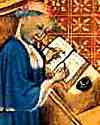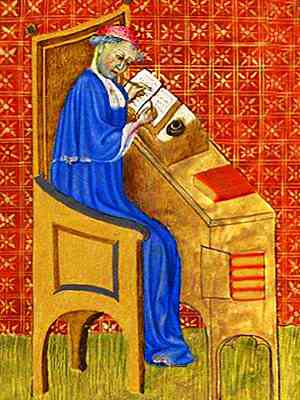 (source)
(source)
|
Nicole Oresme
(c. 1320 - 11 Jul 1382)
French natural philosopher, mathematician and theologian who was a wide-ranging and prescient thinker, though today he is often overlooked. He translated several Latin texts of Aristotle into French, which he annotated with his own critical and original thoughts.
|
Science Quotes by Nicole Oresme (7 quotes)
But having considered everything which has been said, one could by this believe that the earth and not the heavens is so moved, and there is no evidence to the contrary. Nevertheless, this seems prima facie as much, or more, against natural reason as are all or several articles of our faith. Thus, that which I have said by way of diversion (esbatement) in this manner can be valuable to refute and check those who would impugn our faith by argument.
— Nicole Oresme
On the Book of the Heavens and the World of Aristotle [1377], bk. II, ch. 25, sect. 10, trans. A. D. Menut and A. J. Denomy, quoted in Marshall Clagett, The Science of Mechanics in the Middle Ages (1959), 606.
But if the heavens are moved by a daily movement, it is necessary to assume in the principal bodies of the universe and in the heavens two ways of movement which are contrary to each other: one from east to west and the other from west to east, as has often been said. And with this, it is proper to assume an excessively great speed, for anyone who reckons and considers well the height of distance of the heavens and the magnitude of these and of their circuit, if such a circuit were made in a day, could not imagine or conceive how marvelously and excessively swift would be the movement of the heavens, and how unbelievable and unthinkable.
— Nicole Oresme
In Isaac Asimov and Jason A. Shulman (eds.), Isaac Asimov’s Book of Science and Nature Quotations (1988), 329. Webmaster so far has been unable to locate the primary source (can you help?)
It is probable that two proposed unknown rations are incommensurable because if many unknown rations are proposed it is most probable that any [one] would be incommensurable to any [other].
— Nicole Oresme
In De Proportionibus Proportionum (1351).[Note: incommensurable, mathematical term refers to numbers in a ratio that cannot be expressed as a ratio of integers.]
No sector of a circle is so small that two such [bodies bodies moving with uniform but incommensurable velocities] could not conjunct in it at some future time, and could not have conjuncted in it sometime [in the past].
— Nicole Oresme
In Tractatus de commensurabilitate vel incommensurabilitate motuum cell.
One could not by any experience whatsoever demonstrate that the heavens, and not the earth, are moved with a diurnal motion.
— Nicole Oresme
In Livre du ciel et du monde (On the Book of the Heavens and the World of Aristotle) (completed 1377), Book 2, Chap 25. Translated by Menut and Denomy (1968), as excerpted in Marshall Clagett, The Science of Mechanics in the Middle Ages, 600. Also found translated as, “No experience whatsoever could prove that the heavens rotate daily and not the earth.”
The perfection of the heavenly spheres does not depend upon the order of their relative position as to whether one is higher than another.
— Nicole Oresme
As quoted in Edward Grant, Planets, Stars, and Orbs: The Medieval Cosmos, 1200-1687 (1996), 231, citing Oresme, Le Livre du ciel, (1968), Book 2, 507.
https://books.google.com/books?isbn=052156509X
Edward Grant - 1996
There are three ways in which profit may be made from money, without laying it out for its natural purpose: one is the art of the moneychanger, banking or exchange, another is usury, a third alteration of the coinage. The first way is contemptible, the second bad and the third worse.
— Nicole Oresme
From Oresme’s De moneta (c. 1373). Latin to English translation by Charles Johnson, 'A Treatise on the Origin, Nature, Law and Alterations of Money', The De Monera of Nicholas Oresme (1956, 2009), 27.
Quotes by others about Nicole Oresme (1)
No medieval schoolman has been singled out as a precursor more often than the French scholastic Nicole Oresme.This brilliant scholar has been credited with … the framing of Gresham’s law before Gresham, the invention of analytic geometry before Descartes, with propounding structural theories of compounds before nineteenth century organic chemists, with discovering the law of free fall before Galileo, and with advocating the rotation of the Earth before Copernicus. None of these claims is, in fact, true, although each is based on discussion by Oresme of some penetration and originality …
In Nicole Oresme and the Medieval Geometry of Quantities and Motions (1968).
See also:
- 11 Jul - short biography, births, deaths and events on date of Oresme's death.
- Nicole Oresme - 'A Forerunner of Copernicus' from Scientific American (1910).

 In science it often happens that scientists say, 'You know that's a really good argument; my position is mistaken,' and then they would actually change their minds and you never hear that old view from them again. They really do it. It doesn't happen as often as it should, because scientists are human and change is sometimes painful. But it happens every day. I cannot recall the last time something like that happened in politics or religion.
(1987) --
In science it often happens that scientists say, 'You know that's a really good argument; my position is mistaken,' and then they would actually change their minds and you never hear that old view from them again. They really do it. It doesn't happen as often as it should, because scientists are human and change is sometimes painful. But it happens every day. I cannot recall the last time something like that happened in politics or religion.
(1987) -- 


